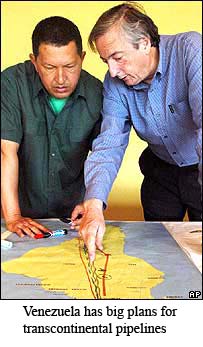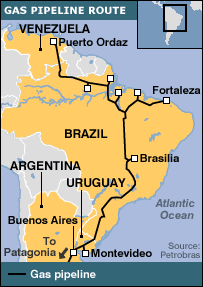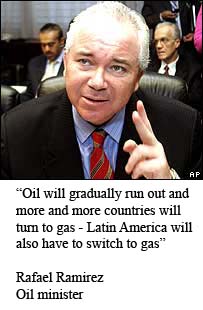Venezuela basks in oil 'bonanza'
 (By Greg Morsbach BBC) - Venezuela’s government led by President Hugo Chavez is benefiting from what can only be described as an oil bonanza.
(By Greg Morsbach BBC) - Venezuela’s government led by President Hugo Chavez is benefiting from what can only be described as an oil bonanza.A barrel of Venezuelan crude oil is currently worth more than $50 and the country’s proven petroleum reserves of around 78bn barrels are in pretty good shape too.
So at the current official rate production of 3.3 million barrels a day, Venezuela has a guaranteed supply of 78 years of crude oil.
For the past year or so the government has started spending much of the wealth generated from oil sales on projects abroad.
Experts believe that President Chavez has spent some $5bn on energy ventures outside Venezuela - including new or jointly operated oil refineries in Cuba, Uruguay and Brazil.
The driving force behind Venezuela’s spending spree is the desire to integrate South America’s energy sector, to become more self-sufficient and less dependent on the United States as a trading partner. The Venezuelan government says the overriding goal is economic integration for Latin America.
Hand-outs
“It was an absurd situation where for the past 100 years of oil production here in Venezuela, we didn’t ship a single barrel of petroleum to the Caribbean, Brazil, Argentina or Uruguay,” Venezuela’s Oil Minister, Rafael Ramirez, told BBC News in an exclusive interview.
“It was an absurd situation where for the past 100 years of oil production here in Venezuela, we didn’t ship a single barrel of petroleum to the Caribbean, Brazil, Argentina or Uruguay,” Venezuela’s Oil Minister, Rafael Ramirez, told BBC News in an exclusive interview.

“But now with the government of President Chavez, we have set up a system of shipping cheap oil to other Latin American countries, in return for agricultural and industrial products or even medical services.”
Venezuela is indeed providing subsidised oil to several countries, including Argentina, Bolivia, Paraguay, Cuba and Uruguay.
Local media say Cuba receives around 100,000 barrels of cheap Venezuelan oil a day and in return is loaning some 20,000 Cuban medics who provide free health care to Venezuela’s shanty towns.
Other handouts from Venezuela’s oil riches include a brand new hospital in Uruguay and the country made offers of millions of dollars of aid for the victims of Hurricane Katrina in the US, as well as cheap heating oil for poor families in Boston and New York.
Sphere of influence
Some political analysts warn that Venezuela’s generosity comes with strings attached.

Jose Toro-Hardy, a former director at the state-owned oil company PDVSA and an outspoken critic of President Chavez said: “Mr Chavez hands out oil and cash like there’s no tomorrow - but in return he expects loyalty and solidarity from the presidents of some those countries he is supplying.”
“Oil is being used to create or even buy a Venezuelan sphere of influence in Latin America and the Caribbean,” Mr Toro-Hardy told BBC News.
However, Mr Chavez and his ministers are increasingly putting natural gas at the forefront of their long term strategy for the next 20 years.
The oil minister - who is also the chief of PDVSA - predicts that gas may eventually supplant oil as his country’s main export.
Venezuela, with its 148 trillion cubic feet of natural gas, has the largest proven gas reserves in Latin America.
“Oil will gradually run out around the world and more and more countries will turn to gas. Latin America will also have to switch to gas. In fact it’s much more efficient to generate energy using gas than with oil,” Mr Ramirez said.
Long way to go
Venezuela is addressing that issue by spearheading a mammoth $20bn project to build a gas pipeline.

The seven-year construction programme - which is also being supported by Brazil and Argentina - would see the pipeline run all the way from Venezuela in the north to Patagonia at the southern tip of South America.
The pipeline programme is still in the planning phase, but the 8,000km gas connection would help cover most if not all of South America’s gas demands, if it ever became a reality.
“Argentina is a net importer of gas and much of its industry is based on gas. Argentina will need a lot more of it in the future. Brazil also has very small gas reserves. Chile is so desperate for gas it’s considering importing it from Australia,” Mr Ramirez said.
Against that background, the only logical thing for the Venezuelan government is to start building the pipeline as soon as all the engineering surveys have been completed.
However, some energy analysts believe that the project will become too expensive, as the pipeline would have to go underneath several big rivers and cut a swathe through the Amazon rainforest which also worries several environmental groups.
You can return to the main Market News page, or press the Back button on your browser.

